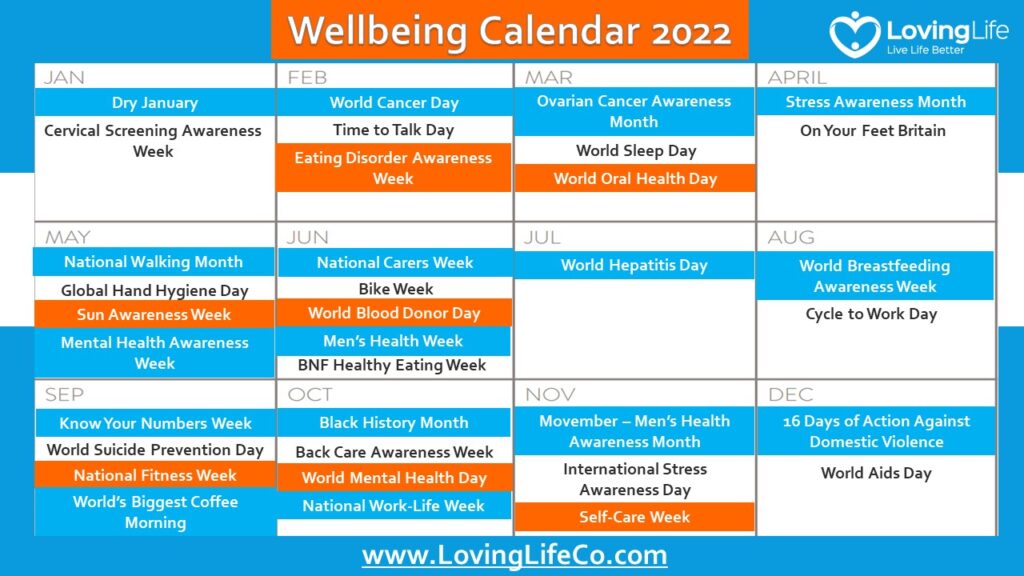2022 Wellbeing Calendar
Download your free 2022 wellbeing calendar today!

It’s been a challenging few years and the less mentioned about the previous two years, the better!
Let us now shift our focus to 2022 and establish preparations for a great year at work and home.
Keeping track of all the wellbeing-related dates across the year and planning work activities accordingly may be difficult. We’ve compiled a list of all the dates you need to keep in mind.
This list of 2022 wellbeing work dates will put you in the driver’s seat for a successful wellbeing campaign to support your employee’s wellbeing in 2022.
1st – 31st January | Dry January
January is a perfect time to recharge and renew after the Christmas and New Year celebrations.
Dry January is a 31-day alcohol-free challenge that tries to raise awareness about the negative effects of alcohol.
Participating allows you to get rid of a hangover, lose weight, increase energy, and save money while doing a lot of good for your health.

21st-28th January 2022 | Cervical Screening Awareness Week
Cervical Screening Awareness Week encourages women and everyone with a cervix to get regular cervical screenings. Cervical screening is a cancer-prevention test. It searches for symptoms that might lead to cervical cancer, which can be diagnosed years before the disease manifests.
According to statistics, 99.8% of cervical cancer cases are avoidable, saving 3,000 lives each year. However, many individuals are hesitant to undergo this test, with a quarter of women failing to follow up on their screening invitation. A nurse uses a tiny, soft brush to obtain a sample of cells from the cervix during a cervical screening (formerly known as a ‘smear test’) consultation. It just takes a few minutes to complete the exam.
Here’s how employees can book theirs!
4th February | World Cancer Day
Since cancer is all too common, it is a problem that most companies will face with one or more employees. The 4th of February 2022 will be World Cancer Day. According to Macmillan, a third of the 2 million persons diagnosed with cancer at any given moment are in their working years.
As a result of COVID, cancer may become a greater burden for companies. Doctors’ attention has been distracted, and many individuals feel hesitant to seek medical advice. It has caused delays in early diagnosis and treatment strategies, perhaps resulting in poorer results for many patients.
Employers must understand and engage successfully in the cancer discourse, as well as encourage and train managers in having cancer-related dialogues. Employee support throughout treatment, as well as managing a return to work after cancer, must be handled with care.
6th February | Time to Talk Day
One in every four of us suffers from mental health issues, which is a severe issue that needs to be addressed more frequently. It is a common, yet isolating challenge, and people can frequently begin to feel humiliated or alone as a result of it.
Time to Talk Day is an opportunity for everyone to be more vocal about their mental health. Make sure you find time throughout the day to get a cup of coffee and check in with your colleagues to see how they’re doing
.

6th – 12th February | Eating Disorder Awareness Week
Every year in the UK, a week is dedicated to increasing awareness of eating disorders, which are severe mental health diseases, not fads or lifestyle choices.
Even though people’s awareness of eating disorders has grown over time, there are still many myths, stigmas, and misunderstandings concerning them.
1st – 31st March | Ovarian Cancer Awareness Month
Ovarian cancer is the leading cause of gynaecological death in women and adults with ovaries in the United Kingdom, with survival rates in the UK among the lowest in Europe. Three-quarters of those diagnosed had advanced cancer, making therapy more challenging.
This is why raising awareness is so vital – March, in particular, is a time to advocate and speak out for more funding and research into ovarian cancer, which will help to improve life expectancies and the quality of life for individuals suffering from the disease.
18th March | World Sleep Day
Employers require their employees to be well-rested in order for them to function efficiently. World Sleep Day will be observed on March 18, 2022.
Fatigue is a well-known problem for shift workers, especially night shift employees. Poor sleep, insomnia, and exhaustion can impact any employee, including those who work remotely.
Fatigue, on the other hand, is not just a detriment to productivity; it may also be the cause of workplace accidents. Tired workers make mistakes, lose attention, and may underestimate risk.

20th March | World Oral Health Day
The goal of World Oral Health Day is to provide individuals with the knowledge, resources, and confidence they need to maintain excellent oral health.
Oral diseases are a serious public health problem in many nations, and they have a long-term harmful influence on people. Oral diseases cause pain and discomfort, as well as social withdrawal and a loss of self-esteem, and they are frequently connected to more major health problems.
However, there is no need to suffer: the majority of oral health problems are usually preventable and treatable in their early stages.
1st – 30th April | Stress Awareness Month
Millions of individuals in the UK are stressed, and it is affecting their health. Stress is one of our major public health threats, yet it isn’t treated as seriously as physical health issues.
During Stress Awareness Month, healthcare workers and health promotion specialists work together to raise public awareness about the causes and treatments of our modern stress epidemic.
Although stress is not a disease, it can lead to sickness and has long been a source of concern for employers.
According to the Stress Management Society, 65% of individuals felt more stressed as a result of the pandemic. Employers can participate in Stress Awareness Month, which begins on April 1st, 2022.
Support employee wellbeing this month with a coping with stress wellbeing webinar!

29th April | On Your Feet Britain
For On Your Feet Britain, workplaces and individuals throughout the UK will be urged to sit less and exercise more during the working day on Friday.
The Get Britain Standing initiative, in collaboration with Active Working, will urge the country to stand up against lengthy periods of office sitting by accepting the challenge.
With the introduction of modernised ways of working, we have lost two-thirds of the activity that was formerly in the workplace in the last 40 years in the UK. According to Active Working, the average office worker now sits for ten hours every day, with 70% of the time spent at work.
Get employees moving and energised with a tailored online energiser session.
1st – 31st May | National Walking Month
National Walking Month is an annual commemoration of the benefits of walking. This month, people are encouraged to take up the challenge of walking 20 minutes as part of their regular workout.
Following the events of the previous year, more of us than ever are relishing the opportunity to get out of the home for a stroll. It’s critical that we stay active, both for our health and to prevent causing future health issues for ourselves and the NHS.
A daily brisk walk can help you improve your health by lowering your risk of a variety of avoidable diseases, such as some cancers, depression, heart disease, and Type 2 diabetes.
Support employee wellbeing with an “Improve your physical wellbeing webinar!”
5th May | Global Hand Hygiene Day
The campaign’s goal is to mobilise action at the point of care to show that hand cleanliness is the key to lowering healthcare-associated infection and ensuring patient safety. It also intends to show the international community’s commitment to this critical sector of health care.
The WHO’s role includes promoting participation and action to keep this worldwide movement going. The expanding number of health-care facilities enrolled for SAVE LIVES: Clean your hands, but that is not the end of the process. Maintaining patient safety initiatives necessitates focused action and creativity, both of which are now more important than ever.

6th – 13th May | Sun Awareness Week
Sun Awareness Week urges individuals to check for indications of skin cancer regularly and educates everyone about the hazards of sunburn and excessive tanning.
The British Association of Dermatologists, a non-profit that performs dermatological education, training, and research, is organising Sun Awareness Week as a supporter of IOSH’s award-winning No Time to Lose (NTTL) campaign.
Non-melanoma skin cancer is the most commonly diagnosed cancer in the world, with an estimated 2-3 million cases reported each year.
9th – 15th May | Mental Health Awareness Week
Since the outbreak of the epidemic, many companies have pushed mental health to the top of their priority list. However, it has always been a critical issue.
UK Mental Health Awareness Week has been ongoing for several years and will begin on May 9th, 2022.
There are many different types of mental health problems. Stress, sadness, anxiety, and more serious disorders such as bipolar disorder or schizophrenia are all examples.
If they are severe, any of these might be deemed an impairment under the law. They can have a substantial influence on an employee’s overall wellbeing and capacity to work.
Managers may find depression to be a particularly difficult subject to address. Along with its connection to suicide prevention, it is an essential topic of education and awareness.
7th – 12th June 2022 | National Carers Week
Carers Week is an annual effort to increase awareness of caring, highlight the problems faced by unpaid carers, and acknowledge the contribution they make to families and communities across the United Kingdom.
It also assists those who do not consider themselves to be caregivers in identifying as such and obtaining much-needed assistance.
Thousands of individuals and organisations join together to give support for carers, host events and raise awareness about the critical role that carers play in our communities, highlighting the importance of caring.
8th – 15th June | Bike Week
Bike Week emphasises the numerous advantages of riding, ranging from apparent health and physical benefits to emotional wellbeing, community, social, and environmental benefits.
Cycling is significant from a sustainability standpoint because it allows us to minimise fossil fuel-based travels, particularly those short excursions that are most harmful in terms of emissions.
Cycling is also beneficial to community health and wellbeing: removing vehicles off the road improves air quality and increases a community’s general fitness levels.
Support employee wellbeing with an “Improve your physical wellbeing webinar!”

14th June | World Blood Donor Day
Every year, countries all across the world honour blood donors on World Blood Donor Day (WBDD).
The purpose of the event is to promote awareness about the need for safe blood and blood products, as well as to honour unpaid, voluntary blood donors for their life-saving contributions.
A blood service that provides patients with enough safe blood and blood products is an important part of a well-functioning health system.
Every year, the worldwide subject of World Blood Donor Day varies to honour the altruistic individuals who donate their blood for others they don’t know.
14th – 20th June | Men’s Health Week
The goal of Men’s Health Week, which is organised by the Men’s Health Forum, is to promote awareness of avoidable health conditions and urge men and boys to seek professional help for health-related difficulties.
The purpose is to raise worldwide awareness of male health concerns and to urge international and domestic organisations to establish health policies and services that address the unique requirements of men, boys, and their families.
Support employee wellbeing with a Men’s Health Week Webinar!

17th June | National Clean Air Day
Every year, air pollution kills up to 36,000 people in the United Kingdom. Air pollution is the major environmental health concern we face today, according to the World Health Organisation and the UK government. Poor air quality is connected to low birth weight and children’s lung development, as well as contributing to mental health difficulties.
Clean Air Day is the greatest anti-pollution movement in the UK, involving thousands of people at hundreds of activities and reaching millions more through the media.
13th – 17th June 2022 | BNF Healthy Eating Week
Healthy Eating Week is a designated week in the year for the British Nutrition Foundation (BNF).
It aims to urge organisations across the UK (including companies, universities, colleges, and schools) to focus on healthy eating and drinking, as well as physical exercise, and to celebrate healthy living.
One of the biggest causes of type two diabetes is being overweight, often due to poor dietary choices.
Support employee wellbeing with a Diabetes Awareness Webinar
28th July | World Hepatitis Day
WHO and partners commemorate World Hepatitis Day every year on July 28th to raise awareness and understanding of viral hepatitis and the illnesses it causes. On this day, Nobel Laureate Professor Baruch Samuel Blumberg, the man who discovered the hepatitis B virus, celebrates his birthday.
Hepatitis viruses come in five varieties: A, B, C, D, and E. Hepatitis A, B, C, and D viruses can cause acute infection and inflammation of the liver, but they can also induce chronic hepatitis, which can progress to cirrhosis and liver cancer.
1st – 7th August | World Breastfeeding Awareness week
World Breastfeeding Week (organised by the World Alliance for Breastfeeding Action) is a global campaign to increase awareness and mobilise action around breastfeeding-related issues.
Healthcare systems, women and work, community support, economy, science, education, and human rights are among the topics covered.

5th August | Cycle to Work Day
Cycle to Work Day was intended to encourage individuals to do exactly that: cycle to work. It encourages individuals to get on their bikes and pedal to work at least once a year.
There are several advantages to riding a bike to work. Not only will this be beneficial to your health, but you will also be helping the earth.
Government and state efforts have even been launched throughout the world to encourage individuals to ride to work more frequently.
Companies can support their employees by registering for the cycle to work scheme.
Support employee wellbeing with an “Improve your physical wellbeing webinar!”
6th – 12th September| Know Your Numbers Week
Blood Pressure UK organises Know Your Numbers Week, a nationwide blood pressure testing event, to encourage individuals to check their blood pressure and raise awareness about the health and wellness risks of high blood pressure.
Hundreds of “Pressure Stations” will be put up throughout the country this week to provide free blood pressure checks, allowing thousands of people to obtain a free blood pressure check.
The goal is to educate individuals to be aware of their blood pressure readings and to take the required steps to achieve and maintain a healthy blood pressure.
10th September | World Suicide Prevention Day
According to the most recent suicide data, over 6,800 people died by suicide in the UK and the Republic of Ireland in 2018. Suicide claims the lives of people all around the world.
We also know that suicide can be preventable; it’s not inevitable. However, not being alright is still frowned upon. Governments can still develop better, more ambitious suicide prevention policies.
As a result, every year, organisations and communities all around the world join together to raise awareness about how we can reduce the number of individuals who commit suicide.
Each year’s topic and focus are different, highlighting a particular area of suicide prevention.
13th September | World Sepsis Day
World Sepsis Day is an excellent opportunity to raise public awareness about this little-known healthcare tragedy, as well as to demonstrate support and solidarity with the millions of individuals who have lost loved ones to sepsis or who, as sepsis survivors, are dealing with the long-term effects of sepsis.
World Sepsis Day is an excellent chance to remind the public, the media, national and international health care authorities, health care providers and employees, policymakers, and governments that education at the facility, regional, national, and worldwide levels is critical.
17th September | World Patient Safety Day
The World Health Assembly created World Patient Safety Day in 2019 through resolution WHA72.6 on “Global action on patient safety.”
The day’s goals are to improve worldwide patient safety awareness, boost public participation in healthcare safety, and support global action to prevent and decrease unnecessary damage in healthcare settings.
Each year, a new subject is chosen to highlight a critical patient safety issue that requires immediate attention to prevent unnecessary injury in health care and achieve universal coverage.
20th – 26th September | Organ Donation Week
During Organ Donation Week, families are encouraged to come together and discuss organ donation.
Organ donation may have moved to an opt-out system in England and Scotland last year – meaning you’ll be considered an organ donor after your death unless you’ve clearly stated that you don’t want to be – but it’s still crucial to express your preferences and let your family know where you stand.
Only about 42% of the UK population is registered on the NHS Organ Donor Register, which indicates that you want your organs and tissue to be donated to someone else in need if you die.
20th – 26th September | National Eye Health Week
National Eye Health Week is a campaign that raises the profile of optics by encouraging the public to be “eye-aware” through several programmes. The programmes encourage increased adoption of routine sight exams and emphasise the significance of healthy lifestyles in avoiding preventable sight loss.
Two million individuals in the UK have severe enough vision loss that it interferes with their everyday life — but half of this vision impairment is preventable. Routine eye exams can detect early indicators of illnesses such as glaucoma and diabetic retinopathy, which can be treated if detected early.
To preserve excellent eye health, make sure you eat healthily, don’t smoke, and use eye protection in harsh sunlight.

22nd September | National Fitness Day
National Fitness Day inspires individuals throughout the country to make September 26th the most active day of the year. It emphasises the importance of physical activity in leading a healthier, happier, and more active existence.
Support employee wellbeing with an “Improve your physical wellbeing webinar!”
25th September | World’s Biggest Coffee Morning
The World’s Biggest Coffee Morning, which takes place on September 24 this year, is a day to enjoy one of the world’s favourite beverages while simultaneously helping to raise funds for cancer patients.
Cancer is the second biggest cause of death worldwide, killing 9.6 million people each year. Early identification, prevention, and treatment, on the other hand, might save roughly 3.7 million lives per year.
The World’s Biggest Coffee Morning began in 1991, with over 200,000 people participating across the United Kingdom. The event has already raised nearly $25 million for Macmillan Cancer Support.
1st – 29th October | Stoptober
Stoptober is the annual quit-smoking campaign in the UK. During October, smokers around the country are encouraged to throw away their cigarettes in an attempt to quit smoking for 28 days.
The campaign is based on the fact that quitting smoking for 28 days increases your chances of quitting for good by five times (West and Stapleton 2008). In this article, we examine the effectiveness of the smoking cessation programme in assisting people in quitting smoking.

1st – 31st October | Black History Month
In the UK, October is Black History Month. The US government recognised the occasion in 1976, while the UK honoured it for the first time in 1987.
For centuries, people from Africa and the Caribbean have played an important role in British history. Campaigners, on the other hand, think that their worth and contribution to society is frequently disregarded, ignored, or misunderstood.
Most schools still teach a history curriculum that emphasises conventional events and white figures’ accomplishments. Everyone may share, celebrate, and comprehend the importance of black ancestry and culture during Black History Month.
Educate employees on unconscious bias and the negative influence the media can have with a “Let’s talk about race” webinar.
1st – 31st October | National Cholesterol Month
Following World Heart Day on September 29th, October is National Cholesterol Month, a HEART UK campaign aimed at raising awareness about the significance of sustaining a healthy cholesterol level.
High cholesterol levels are associated with an increased risk of coronary heart disease. Although over half of UK individuals have high cholesterol, many are unaware of it.
In fact, according to a recent study, over a third of the UK population has never had their cholesterol levels examined, leaving a substantial number of possible diseases undiagnosed. As a result, it is critical to increase your understanding and knowledge about the dangers of excessive cholesterol.
1st – 31st October | Breast Cancer Awareness Month
October is Breast Cancer Awareness Month, an annual international campaign aiming at increasing information and raising funding for more breast cancer research.
Breast cancer is the most frequent cancer in women globally, affecting at least 2.1 million people each year. Breast cancer was predicted to account for 15% of all cancer deaths in women in 2018, according to the World Health Organization (WHO).
Breast cancer is most frequent in women over the age of 50 who have gone through menopause, although it can also affect younger women and men. A family history of breast cancer, genetic mutations, and lifestyle factors such as smoking and being overweight or obese are all risk factors.
Breast cancer and its risk factors can be recognised sooner and potentially even prevented if people are more aware of them.

4th – 8th October | Back Care Awareness Week
It is estimated that over eight million UK individuals suffer from chronic back pain, which costs the economy approximately £10 billion every year.
Back Care Awareness Week provides a chance for companies to consider how they can best support the health and wellbeing of sedentary workers while also advocating behavioural changes to encourage more productive lifestyles.
Support employees who are working from home with a “Working from home, best practice” webinar
10th October | World Mental Health Day
The overarching goal of World Mental Health Day is to promote global awareness of mental health concerns and organise support for mental health programs.
The Day allows all stakeholders focusing on mental health issues to discuss their work and what more needs to happen to make mental health care a reality for people all around the world.
Discussions on mental wellbeing, emotional wellbeing and wellbeing in general are all important to highlight and it’s important that we recognises this all year round, and not just on world mental health day.
11th – 15th October | National Work-Life Week
National Work Life Week strives to raise awareness among employees and employers about the need for workplace wellbeing and a healthy work-life balance.
It’s a chance for companies to demonstrate to their employees how their company promotes a family-friendly and flexible work environment.
11th – 17th October | UK Malnutrition Awareness Week
The Malnutrition Task Force and BAPEN established UK Malnutrition Awareness Week in 2018 to promote awareness of undernutrition and dehydration in the UK.
The yearly campaign aims to raise awareness of this critical issue among health and social care professionals, community groups, and the general public, as well as mobilise individuals to recognise and prevent malnutrition.
Malnutrition affects as least 3 million individuals in the UK, and the incidence of malnutrition-related hospital admissions has risen in the previous ten years. Malnutrition is predicted to cost the health and social care sector around £20 billion each year.
14th – 20th October | Infection Prevention Control Week
Every year in October, Infection Prevention Control Week is conducted to promote awareness about the need for infection prevention.
Infection Prevention and Control is critical for protecting everyone from outbreaks of healthcare-associated illnesses like COVID 19, the flu, measles, chickenpox, and a slew of other infections — even the common cold.
Infection Prevention Awareness Week focuses on the role that people may play in preventing infection not only for themselves and their loved ones, but also for our healthcare community as a whole. To assist reduce the spread of infections, it is recommended that everyone implement basic Infection Prevention and Control practices, especially during the winter.
Everyone can help reduce the spread of infectious illnesses all year long by knowing the science underpinning infection prevention and control.
18th October | World Menopause Awareness Day
World Menopause Day is a global awareness campaign for women who are experiencing health problems as they approach, go through, or leave menopause.
World Menopause Day is a chance for men, women, healthcare professionals, the press, and the media to come together to increase awareness about the reality of female health and treatment alternatives while combatting worldwide stigma and misinformation.
1st – 30th November | Movember – Men’s Health Awareness Month
Men are urged to grow moustaches during November to promote awareness and generate discussion on men’s health issues, including prostate cancer, testicular cancer, and mental health.
Men’s health is at an all-time low. Simply put, males are dying at an alarmingly young age.
One of the most powerful and reliable determinants of health and life expectancy is gender. This is not good news for males. Men die 6 years earlier than women on average over the world.
Furthermore, poor mental health impacts males more than women since men account for three-quarters of all suicides. According to the World Health Organisation, 510,000 males die by suicide each year throughout the world. Every minute, that’s one.
Support employee wellbeing with a Men’s Health Webinar!

2nd November | International Stress Awareness Day
The goal of International Stress Awareness Day is to raise awareness about stress. The goal is to ensure that persons who are experiencing stress are aware of where they may get help and what steps they can take to prevent and manage stress.
Support employee wellbeing this month with a coping with stress wellbeing webinar!
15th – 21st November | Self-Care Week
Self-Care Week is an annual national awareness week dedicated to promoting self-care in families and communities.
Self-Care Week strives to educate individuals on how they may actively care for their own and their families’ health, as well as live as healthily as possible.
It’s a great opportunity to reflect on how we live our lives and perhaps make some minor changes to help us better care for ourselves and our family.
These modifications might include examining what we eat and drink, as well as how much activity we receive and how much sleep we get. They might be about our work-life balance because remaining in touch with our friends and family is as important for our health and that of our loved ones.
Support employee wellbeing with a fun, interactive wellbeing webinar.
15th – 22nd November | Alcohol Awareness Week
Alcohol Change UK’s Alcohol Awareness Week is all about encouraging the discussion about drinking, recognising problematic drinking habits, the impact it has on us and tearing down the shame and stigma associated with alcohol problems.
In England alone, it is believed that less than 20% of dependent drinkers are undergoing treatment, which is worsened by the shame they feel – the hesitation to admit they have an alcohol problem, the desire not to be in treatment, and the worry that they will never recover.
There is still a widespread belief in society that ‘once an alcoholic, always an alcoholic,’ as though problems drinking will constantly torment and characterise someone who accepts the problem. This is not correct.
25th November – 10th December | 16 Days of Action Against Domestic Violence
The 16 Days of Action Against Domestic Violence campaign is targeted at companies to help them combat domestic abuse and violence. Employers are required by law to assess dynamic risk and support their employees’ health, safety, and wellbeing.
Companies can do more to help employees who are victims of domestic abuse, teach those who see it, and safeguard the whole workforce, all to ensure safety and minimise financial damage.
From the 25th of November through the 10th of December, a different subject will be explored each day to investigate the various kinds of domestic abuse. As a result, the workplace will be more able to recognise the indicators that anything is wrong.
1st December | World Aids Day
Every year on December 1st, World AIDS Day is commemorated. It’s a chance for people all around the globe to come together in the fight against HIV, to express solidarity for HIV-positive people, and to remember those who have died as a result of an AIDS-related illness. World AIDS Day was the first global health day, established in 1988.
In the UK, around 105,200 people have HIV. There are an estimated 38 million persons infected with the virus worldwide. Although the virus was only discovered in 1984, over 35 million people have died as a result of HIV or AIDS-related diseases. This makes it one of the deadliest pandemics in history.
World AIDS Day is significant because it serves as a reminder to the public and government that HIV has not gone away. This means that more money, more awareness, prejudice-fighting, and improved education are still required.

